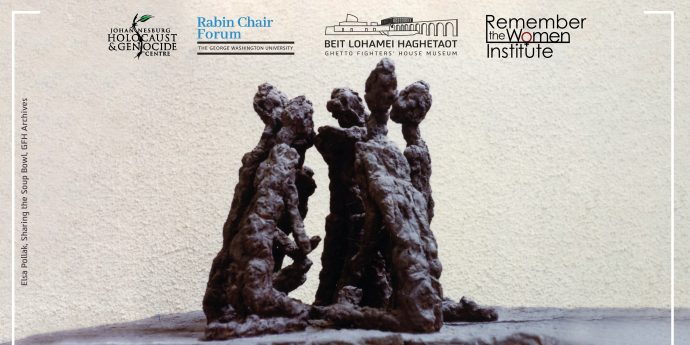





The Ghetto Fighters’ House presented a Zoom event about the solidarity of female prisoners in Nazi concentration camps. If you missed the program, you can watch the recording.
Solidarity: A Vital Support System for Female Prisoners in Nazi Camps, part of the Ghetto Fighters’ House ongoing series, “Bridge Over Troubled Water”: Solidarity and Civic Responsibility in Times of Crisis
Remember the Women Institute is pleased to be a partner for this important Zoom event, which took place on Sunday, February 18, 2024, at 2 PM EST | 8 PM CET | 9 PM IST.
PROGRAM
Opening Remarks:
Dr. Rochelle G. Saidel
Founder and Executive Director, Remember the Women Institute
Guest Speakers:
Dr. Mehak Burza
Solidarity among Female Prisoners: Women’s Experiences in Nazi Concentration Camps
Prof. Yoel Yaari
Bela Hazan: A Devoted Prisoner in the Jewish Women’s Infirmary in Birkenau
The program focused on instances of solidarity and compassion among female prisoners in Nazi camps during the Holocaust, raising questions about the connection between a shared sense of unity and the chances of survival. Dr. Rochelle G. Saidel gave the opening remarks on the importance of researching and discussing the history of women and their unique experiences during the Holocaust.
Dr. Mehak Burza explored the manifestations of solidarity among female prisoners, as well as women employed in various vocations in the concentration camps. Being in double jeopardy as both Jews and women made their survival more arduous in the dehumanizing camp conditions. The women thus resorted to various strategies to keep up the struggle for survival in the camps, while seeking a sense of solidarity and sisterhood. Burza also traced the role of the “kashariyot”- young female couriers who played a crucial role in resisting the Nazi occupation in Europe.
Prof. Yoel Yaari presented the unique story of Bela Hazan, who was born in 1922 in Rozyszcze, Poland. With the outbreak of World War II, she escaped to Vilna, eventually joining the Dror (‘Freedom’) underground youth movement. Under a Polish false identity, she served as a courier, carrying information, bulletins, arms, guns, even infants, across ghetto walls in Vilna, Grodno, Bialystok, Warsaw and elsewhere. In June 1942, she was arrested and tortured by the Gestapo and imprisoned in the notorious Warsaw Pawiak prison as a member of the Polish resistance. Half a year later, still not twenty, she was deported to Auschwitz-Birkenau death camp. During most of her 26 months of internment, she worked as a nurse in the Birkenau women’s camp infirmary. Yaari explored Hazan’s remarkable demonstration of devotion and solidarity as she took care of the patients in the Jewish ward.
This program is in partnership with the Remember the Women Institute, the Rabin Chair Forum at George Washington University, and the Johannesburg Holocaust & Genocide Center.

